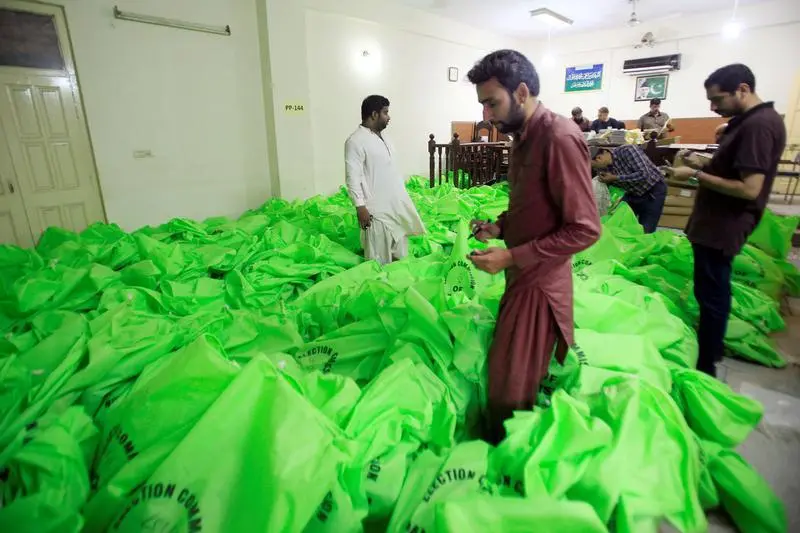PHOTO
Pakistanis go to the polls on Wednesday with more than the usual worries about the shape of the final outcome.
Elections to the National Assembly and provincial assemblies are being held with Nawaz Sharif, a three-term prime minister, in jail. Sharif who, according to a nationwide poll, remains the most popular leader and his daughter Maryam were sent to prison on their return to Pakistan from London last week after being given a 10-year sentence by an anti-corruption court. A popular leader serving a jail term for misappropriation of funds is a rare thing in any country. As such, this should be hailed as a victory for all those who demand probity and accountability from elected officials.
However, critics question whether there is something other than an anti-corruption crusade behind the Sharif familys misfortunes. For one thing, there is the militarys rumored preference for Imran Khan, former cricket star and leader of the center-right Pakistan Tehreek-e-Insaf (PTI) who initiated legal proceedings against Sharif after the release of the Panama Papers in April 2016 that revealed the offshore holdings of the Sharif family.
Second, there are the far from cordial relations between the military and Sharif. Sharif was fired by the military establishment twice in the 1990s on charges of corruption. Sharif resigned as prime minister in July 2017 after the Supreme Court disqualified him from holding office over an undeclared source of income. In April this year the court made it clear that his disqualification was for life. Legal experts ask how anyone could be disqualified from participating in elections forever on the basis of Articles 62 and 63 of the Constitution. This has led to suspicions that there is a conspiracy to obliterate the former premier as a political force.
This is not the only thing that casts doubt on the fairness of the poll. Even after the corruption accusations, Sharifs ruling Pakistan Muslim League-Nawaz (PML-N) retains the top spot as the most popular party, according to the latest polls. It is very popular in central and northern Punjab, from where at least 95 National Assembly seats are up for grabs. This means that in a normal political environment, the PML-N would be going into the election as a favorite.
But the political environment in Pakistan is anything but normal, according to most political parties. The army has frequently intervened in Pakistani politics since independence in 1947, but this time the interference is said to be much more blatant.
The latest thing to cause concern is the Election Commissions decision to grant broad judicial powers to the military at polling stations. Now soldiers will have the authority to hold on-the-spot trials of anyone breaking election laws and to sentence them.
This is in addition to complaints about media censorship and arbitrary disqualifications of leading candidates, along with the manipulation of political parties by intelligence services. There are allegations about pressure from the military or those acting on its behalf to force candidates to defect from their parties and contest the election as independents.
Added to this is the fear created by terrorist attacks on election gatherings. The deadly suicide bomb attack on an election rally in Peshawar on July 10 killed Awami National Party (ANP) candidate Haroon Bilour along with over 100 others. Another attack in Mastung, Balochistan taking place on the day Nawaz Sharif and his daughter returned to Pakistan killed 129 people, including a provincial assembly candidate.
All in all, this appears to be a deeply troubling election for Pakistan. What is expected is a two-way race between parties led by Imran Khan whom some describe as prime minster-select and a jailed former prime minister. The big question is how the army will react if Sharifs party wins the election or emerges as the largest party in the National Assembly.
Copyright 2018 The Saudi Gazette. All Rights Reserved. Provided by SyndiGate Media Inc. (Syndigate.info).





















